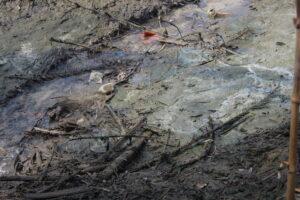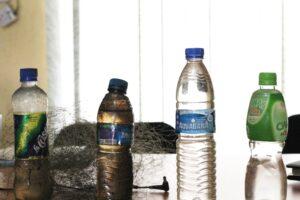Witnessing Nigeria’s Resilience: Oil’s Attacks on Water, Food, and Family
In January 2019, our graduate fellow Nicholas Johnson joined Grassroots International Solidarity Program Officer Mina Remy for a trip to Nigeria. In the blog below, Nicholas describes the contamination grassroots communities are facing, and the resistance they are waging.
During our time in Nigeria, following the conclusion of the National Summit on the Human Right to Water we met with two organizations. They opened their doors to us, and shared stories of the turmoil from denationalizing public water. The two organizations, Health of Mother Earth Foundation and Kebetkache, work in ecological justice from different vantage points, but share the same mission to democratize resources.
Ogoni Land: Poisoned Rivers
The Health of Mother Earth Foundation (HOMEF) is an ecological think-tank that advocates for ecological justice and food sovereignty in Nigeria and throughout Africa. Their reps took us to see one of the most polluted places on the planet: the fishing towns of the Niger Delta. Also known as Ogoni Land, it is home to the Ogoni people, an indigenous community.
A Chief of the Goi Community of Ogoni Land shared the story of reckless extraction of oil by corporations such as Shell and Eni. Their actions have caused oil spills that have leaked for weeks at a time — killing fish, polluting the air, and poisoning the soil. All of this has had sinister effects on people: shortening life expectancy to 41, causing birth complications for many of the women in the area, and waking people from sleep to have them find soot under their noses.

As we stepped out of the car, a strong odor hit our noses. This was just the first sign of the injustice left by Shell; the second showed up as we approached the river delta. We laid our eyes on the once massive body of water, now left with dry pits of oil congealed onto the river floor amid pools of grey & green water of various sizes. A fish caught by some local fishermen was our third sign. Cutting it open revealed flesh filled with oil. The final sign was the frustration in the eyes of the men and women who told us of how the oil pollution had robbed them of their land, water, and peace.
Kebetkache: Food and Family Disrupted
We also met with Kebetkache, a woman’s development organization dedicated to building the capacity of women to break away from patriarchy and traditions that do not support their own empowerment. Throughout their environmental work, Kebetkache provides political education and leadership development to local women using an ecofeminist lens.
Kebetkache’s headquarters is based in the city of Port Harcourt where they organize for clean water and against oil extraction. This extraction has had devastating effects on the climate and food security of rural families.
Our first sight of these atrocities came from three bottles of water pulled from Kebetkache’s village’s river. The first two bottles were cloudy, but the last two were brown with hints of green — all showing signs of oil contamination. But even more tragic was the smell of the water — a strong chemical-laced odor.
Later, Kebetkache took us from their headquarters to their village, to learn more from an Elder and other community members on the challenges they have faced from corporate oil drilling. They testified to the land destruction and its related rifts in family structures. Children are turning their backs on their homes and parents in search of food, which has become harder to secure due to the tainted land. Farming is now more difficult thanks to the overbearing temperatures from nearby gas flaring. Companies burn off, or flare into the atmosphere, natural gas that cannot be processed or sold profitably.

This led us to the final demonstration. We were taken to an oil drilling site owned by Shell, where we witnessed an enormous flame shooting from the ground. We could only imagine what the intensity of its heat must have felt like at high noon.
There are not enough words to describe either the destruction or the resilience which we witnessed during our time in Nigeria. Our site visits allowed us to build greater solidarity with front line communities that are directly impacted by pollution and exploitation. We hope that these words and photos begin to show not only the damage done by a global economic model that values profit above all, but the work to ensure that water, a human right, is controlled by the people.
Nicholas Johnson is Grassroots International’s graduate fellow for Winter 2018-2019 and Spring 2019. He is an Anti-Racism Facilitator and student at Northeastern University studying Global Studies & International Relations.
